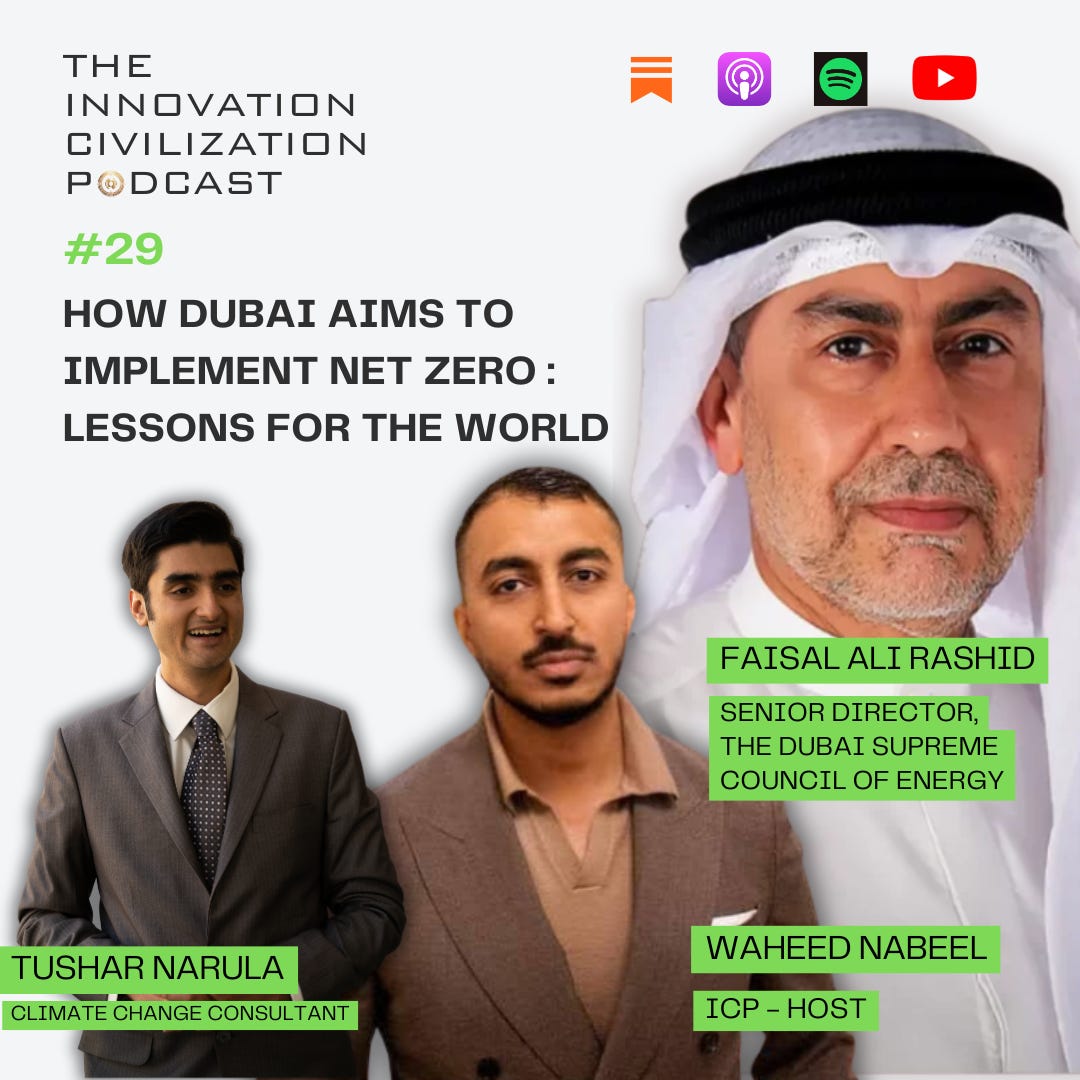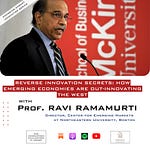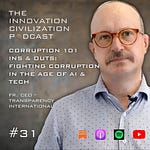Listen now on Apple, Spotify, and YouTube.
Dubai in many ways is a city ‘that just works’. Its 10x-ed its GDP in the last 30 years building the most advanced infrastructure and institutions. I wanted to understand a bit further on how the people who run and make decisions on behalf of the city truly think.
So, I welcomed Faisal Ali Rashid, Sr. Director at the Dubai Supreme Council of Energy, to learn from Dubai's ambitious drive toward achieving net zero by 2050. Faisal, a leader in energy strategy and sustainability, oversees programs transforming Dubai’s approach to energy, water, and waste management, setting a new standard for urban sustainability in the region.
I was also joined by our friend on the podcast, Tushar Narula - a sustainability advisor and a climate change expert whose work has spanned different continents, industries, and top institutions like UC Berkeley, MIT, Harvard, & Imperial College London.
In this episode, Faisal shares Dubai’s comprehensive strategies for renewable energy and demand-side management, revealing key milestones like achieving 25% renewable energy in the total energy mix and aiming for 100% renewable energy by 2050. He explains not only the WHAT but HOW Dubai plans to achieve these in detail.
We also discuss the Dubai Supreme Council of Energy’s regulatory framework, incentive programs, and innovative public-private partnerships (PPPs) that fund green projects, including the groundbreaking Mohammed bin Rashid Al Maktoum Solar Park. Faisal highlights the role of community involvement and youth leadership in advancing sustainability, describing how the Advancing Net Zero initiative empowers the next generation to contribute to Dubai’s climate goals.
Key Takeaways from the Episode:
Dubai’s Ambitious Renewable Energy Goals:
Faisal Ali Rashid outlines Dubai’s target to achieve 100% renewable energy by 2050. Currently, renewable sources account for 15% of Dubai’s energy, with goals set for 25% by 2030. These milestones are part of the Dubai Clean Energy Strategy, which aims to make the city a leader in sustainable urban development.
Demand-Side Management to Boost Efficiency:
Dubai’s energy strategy includes a robust demand-side management program targeting a 30% reduction in energy consumption by 2030 compared to 2013 levels. This initiative encompasses retrofitting buildings, encouraging energy efficiency, and managing water usage to meet sustainability targets.
Public-Private Partnerships (PPPs) for Sustainability:
Dubai leverages public-private partnerships to finance and implement large-scale green projects. The Mohammed bin Rashid Al Maktoum Solar Park, one of the largest in the world, exemplifies this approach, with billions in investment supporting the city’s renewable energy vision.
Circular Economy and Green Mobility:
Beyond energy, Dubai’s sustainability plan includes circular economy initiatives, green building codes, and a commitment to green mobility. Measures like smart metering, district cooling, and solar rooftop installations align with Dubai’s broader environmental goals and push toward net zero.
Empowering Youth and Community in Sustainability:
Through the Advancing Net Zero initiative, Faisal emphasizes the role of youth and community involvement in Dubai’s journey toward sustainability. Programs and workshops engage young people and educate the public, fostering a culture of environmental responsibility and awareness.
Innovations in Technology and Smart Infrastructure:
Dubai is investing in advanced technologies, including AI for smart metering, CSP (Concentrated Solar Power) for 24-hour solar energy, and extensive EV charging networks. The city also explores innovative desalination and water recycling methods to reduce dependence on fossil-fuel-based energy.
Financial Incentives Driving Green Adoption:
Dubai’s Supreme Council of Energy has implemented financial incentives, such as subsidies for energy-efficient technology, green bonds for retrofitting projects, and net metering for solar energy. These incentives encourage businesses and residents to participate in Dubai’s green transformation.
Lessons for Global Cities:
Faisal shares that Dubai’s approach to achieving net zero offers valuable insights for cities worldwide. While Dubai’s unique climate and resources shape its strategy, lessons on efficient policy implementation, technology integration, and community engagement can inspire sustainable development across the globe.
District Cooling: A Model for Urban Cooling Efficiency:
Dubai’s district cooling initiative offers an efficient alternative to conventional air conditioning, reducing energy consumption in urban areas. District cooling covers 25% of the city’s cooling needs, showcasing Dubai’s commitment to sustainable infrastructure.
Dubai’s Vision for Net Zero 2050:
The episode emphasizes Dubai’s comprehensive approach to reaching net zero, integrating renewable energy expansion, advanced water conservation, and smart city initiatives. This vision positions Dubai as a global leader in energy efficiency and climate action, setting a strong example for the region and beyond.
Join me as we dive into Dubai’s pioneering efforts to build a sustainable, net-zero future with one of its leading energy strategists.
Follow me (@iwaheedo), for more updates on tech, civilizational growth, progress studies, and emerging markets.
Timestamps:
(00:00) - Intro
(02:30) - Faisal’s background and Dubai’s sustainability journey
(03:58) - Demand-side management and green building initiatives
(05:47) - Dubai’s renewable energy milestones and 2050 goals
(09:38) - Policy and incentives driving green transition in the middle east
(18:43) - The role of PPPs in funding sustainability projects
(24:12) - Dubai’s innovation in energy storage and technology
(32:33) - Key lessons for global cities on climate action
(38:33) - Youth and community involvement in net-zero goals
(41:28) - Outro














Share this post